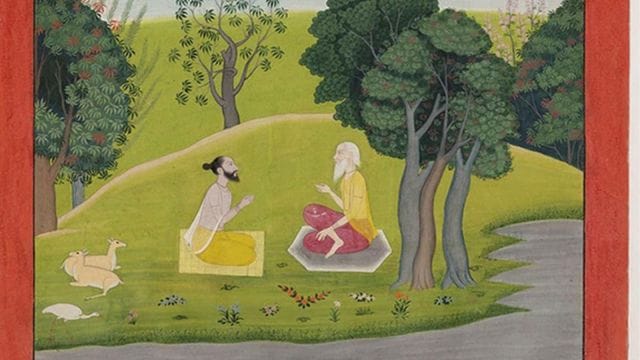Why UK blocked export of unique series of 200-year-old Hindu paintings
The works were produced in the Kangra region of Punjab, but the artist or workshop remains unknown. Officials say the paintings are in excellent condition.
 The UK government has placed an export ban on a set of 56 paintings from around 1810 that depict key stories from Hinduism. (Photo: @standardnews)
The UK government has placed an export ban on a set of 56 paintings from around 1810 that depict key stories from Hinduism. (Photo: @standardnews) The UK government has placed an export ban on a set of 56 paintings from around 1810 that depict key stories from Hinduism, in an effort to keep the collection in the country.
The works, valued at about £280,000, around 3.28 crore, show the origins and victories of Devi, or the Divine Mother. Gold and silver paint appear throughout the scenes, which range from worship to battles between gods and demons.
“This series is not only beautiful but unique in the United Kingdom,” UK Culture Minister Baroness Fiona Twycross said, according to PTI.
She added, “With no other near-complete similar narrative existing in our country, it is important we keep this series in the UK and allow researchers time to unlock its secrets.”
The almost complete set includes 56 of the original 59 paintings, with cover sheets carrying Sanskrit and Hindi inscriptions describing each scene. The works were produced in the Kangra region of Punjab, but the artist or workshop remains unknown. Officials say the paintings are in excellent condition.
The narrative shown across the series tells a story of a struggle between good and evil. One scene includes gods Vishnu and Shiva asking for help, a depiction believed to be unique to this set.
The UK’s Department for Culture, Media and Sport (DCMS) said the paintings offer a rare chance to study how such illustrated stories were created and used. The works have been with Spink and Son in London since the mid-1980s and previously belonged to the family of Dr Alma Camruddin Latifi, who lived between India and the UK during the colonial era.
The UK government said this week that the collection reflects long-standing cultural links between Britain and Punjab, noting that more than one million Hindus live in the UK today. The export bar is intended to keep the paintings available for study and public engagement.
Pippa Shirley, a member of the Reviewing Committee on the Export of Works of Art and Objects of Cultural Interest (RCEWA), said: “In these small paintings, an epic unfolds. We see the Devi in different forms, including Kali in battle, alongside scenes of worship, family life and animals.” She added that the set was used for storytelling and hymn recitations and raises questions about artistic and devotional practice in the colonial period.
She said: “They are also a strong statement of divine female power. With no comparable set in the country, it is important that they remain here so they can be more fully understood and enjoyed.”
The RCEWA recommended the export ban due to the set’s “outstanding significance” for the study of Pahari painting from Himalayan royal courts, its devotional use, and its value in understanding collecting practices during the colonial era.
A final decision on the export licence is delayed until 20 February 2026. After that, the owners will have 15 days to consider any offers to buy the paintings at the recommended price of £280,000 plus £16,000 VAT(₹18.7 lakh). If an offer is made and accepted, a second three-month deferral period will begin.
The Reviewing Committee is an independent advisory body supported by Arts Council England and advises the UK government on whether cultural objects are of national significance.






